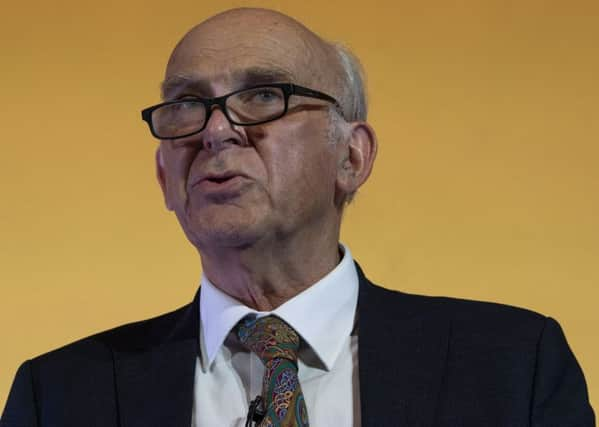Paris Gourtsoyannis: A horror story to chill Vince Cable's blood


Imagine you’re a supporting character in a horror film. The two main protagonists have done what they never should, but always do – trespassed in the boarded up house, held a candle-lit seance, read from the dusty book of spells hidden in the spooky cellar.
Now they’re predictably writhing in the agonies of possession by evil spirits – limbs bent at odd angles, eyes rolling, speaking in tongues. Oh dear. What do you do? Run far, far away? Call Father Karras?
Advertisement
Hide AdAdvertisement
Hide AdNot if you’re the Liberal Democrats. Their response to the turmoil consuming the UK’s two main political parties has been to fling their arms wide and offer their body as a willing vessel for despoliation. “Take me!” they cry.
The saddest thing is that it’s an open question whether the spirits are even interested.
Vince Cable, who would be entering his 80th year by the time of the next scheduled election in 2022, must have known he wasn’t the future of the Liberal Democrats when he was elected leader.
The assumption has been that he is minding the shop through Brexit until a younger, fresher face is ready for the job – perhaps the party’s first female leader, perhaps Jo Swinson.
But Cable has looked at what’s happening in European politics and seen the growing anger at the UK Government’s handling of Brexit, and decided a greater legacy would be to try revive the Lib Dems by turning the party into a vessel for a youthful, pro-EU political movement.
Activists gathering in Brighton at the weekend will begin to chew over plans to open leadership elections and campaigns to non-paying, non-member supporters, and potentially to allow a leader from outside the party altogether.
The well-told story of Emmanuel Macron’s centrist insurgency isn’t the only inspiration Cable and the Lib Dems look to, however. They also aspire to the example of Canada, where party leaders are often elected from outside the House of Commons, and where Justin Trudeau’s ascendancy began with a Liberal Party leadership election in which non-members were allowed to register to take part.
Opening up the party may turn out to be an inspired decision, but just like living in a menacing old house in spite of a booming, disembodied voice yelling “Get out!”, it’s a bit risky.
Advertisement
Hide AdAdvertisement
Hide AdThe first problem is that David Cameron’s Government opened the political Ark of the Covenant with the Brexit referendum, and most of the UK’s anti-establishment energies rushed out in 2016.
While in Europe, those forces have had to find escape via new movements and smaller parties – on the right and the left – in Britain they flowed directly into the two main groupings, leaving little room for other brands.
The second issue is that two years after Trudeau’s election as Liberal leader in 2013, the UK Labour Party tried the same thing. The party assumed a radically different election would have a predictable result, with Andy Burnham or Yvette Cooper triumphing over Jeremy Corbyn.
The lesson there? Best to have a clear idea about who the right candidate is. Swinson must now be wondering if she’ll face Gary Lineker or ‘EU Supergirl’ for the party leadership.
There’s a further risk the Lib Dems have to consider. The federal leadership of the party is already asking Lib Dems in Scotland to argue for a ‘People’s Vote’ on the EU, while rejecting a rerun of the 2014 Scottish independence referendum.
Now Scottish Lib Dems will have to open themselves up to centre-left, anti-Brexit social liberals, presumably on the sole condition they aren’t members of another political party.
Scotland has plenty of those, and lots of them will have voted for independence. At the end of 2016, the Scottish Lib Dems had just shy of 4,000 members.
There must be some nervous looks being exchanged in Edinburgh’s Clifton Terrace, even if they aren’t aware of the less happy Canadian precedent.
Advertisement
Hide AdAdvertisement
Hide AdHistorically, the New Democratic Party (Canada’s third party) never had much of a foothold in Quebec, but as nationalism blossomed in the 1980s, the provincial NDP was overrun with separatists and disbanded, disappearing for nearly 40 years.
There’s a horror story to chill the blood.
